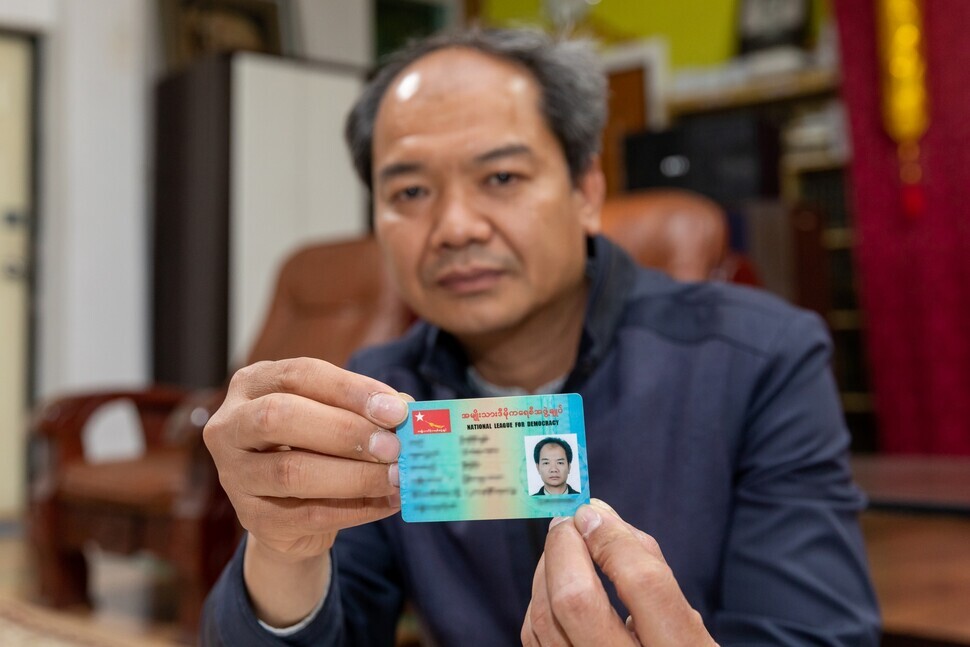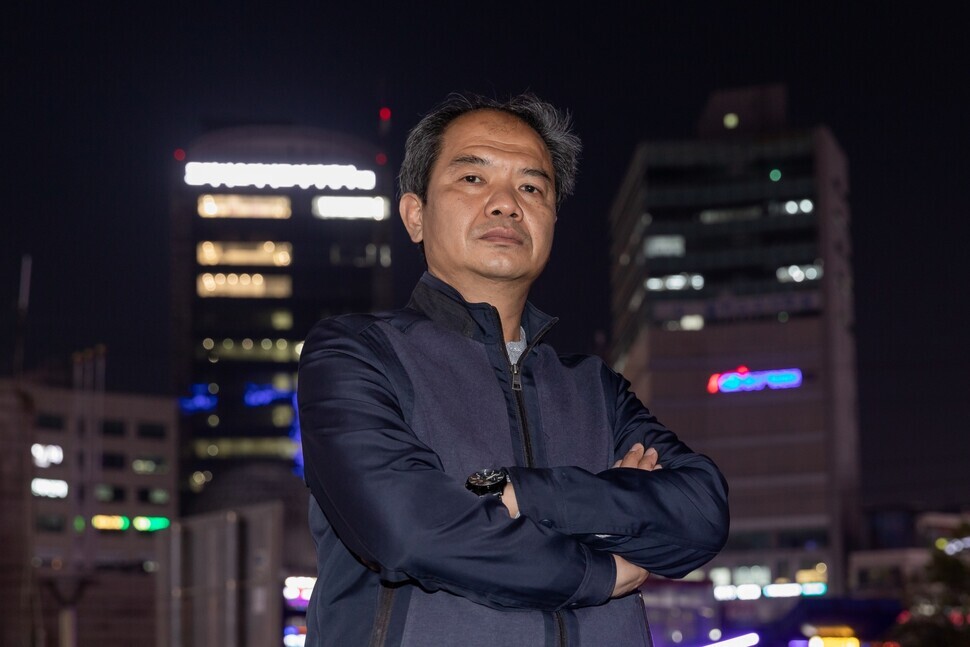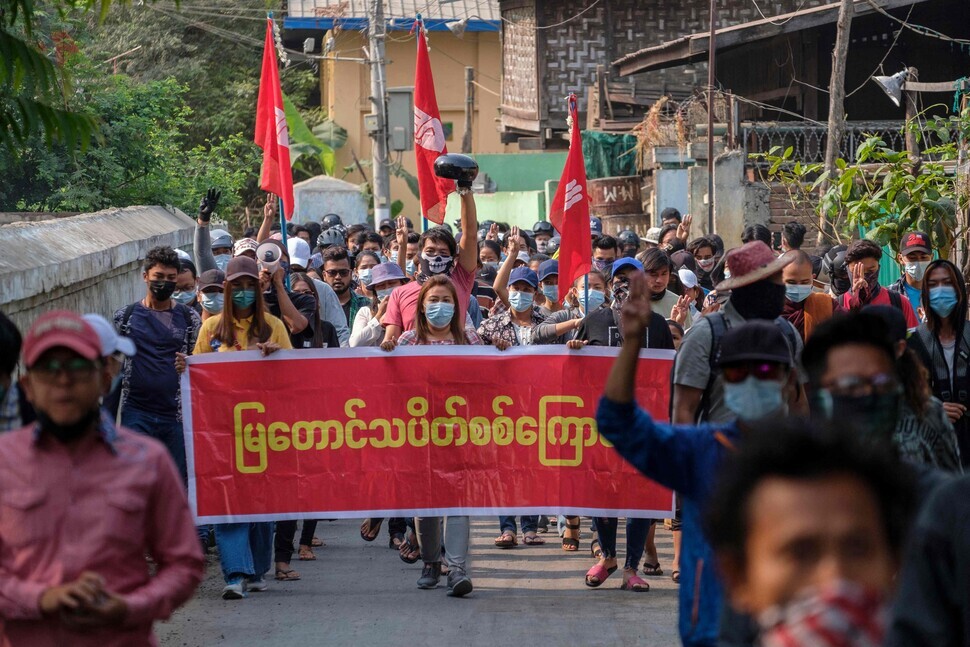hankyoreh
Links to other country sites 다른 나라 사이트 링크
[Interview] Myanmar democracy leader in S. Korea is “100% certain that this democratization movement will succeed”

He was a bookish young man who enjoyed poetry. He also began penning his own verse in his spare time around the age of 17.
In 1988, he went to study at the Yangon University of Economics (formerly the Institute of Economics) in his home city of Yangon. In the heat of the summer during his first semester, a large-scale campaign for democratization developed across the country. It would become known as the “8888 Uprising,” after the date of “Aug. 8, 1988.”
He became an active participant in the demonstrations. The military showed no compunction about using brutal violence to quash them. Three years later, in 1991, he arrived in South Korea.
This is the story of Yan Naing Htun, 51, director of the South Korean chapter of Myanmar’s National League for Democracy (NLD). This year marks his 30th in South Korea, where he has lived for far longer now than he spent in his homeland.

On Tuesday evening, the Hankyoreh met with him at a Myanmar Buddhist temple across from Bupyeong Station in Incheon.
While his body may be in Korea, his mind has always been on his homeland. In 1997, he banded together with like-minded Burmese residents to form the Association for Burmese Democratization.
He would go on to establish a connection with the headquarters of the NLD, led by Aung San Suu Kyi. He contacted his acquaintances in Korea and formed the NLD Organizing Committee Korea, which received the headquarters’ official approval.
According to Yan Naing Htun, the protests in 2021 are quite different from those in the 8888 Uprising.
“In 1988, the military staged a coup after the democratization demonstrations took place, whereas this time there have been larger demonstrations in response to the coup,” he explained.
The biggest differences, he added, were historical and generational ones.
“The ‘Generation Z’ young people in Myanmar today are a lot different from how we were. They’ve staged peaceful demonstrations using various creative methods, and when the military opens fire on them, they scatter and then quickly reassemble,” he said.
Among Myanmar’s citizens — especially younger ones — there is a growing sense that there may be no other approach available besides armed resistance. The national unity government established by pro-democracy groups has even declared the establishment of a “federal army,” which includes minority ethnic groups. Fears of a civil war erupting could become a reality.
“We’ve requested that the UN invoke its Responsibility to Protect and are waiting for support from the US and the international community, but they’ve been like turtles. We call it ‘NATO’ — ‘no action, talking only,’” Yan Naing Htun said.
“Our country’s problem is something we’re going to have to resolve ourselves. That’s why young people and minority ethnic groups want to form a federal army to fight,” he explained.
Where do the people of Myanmar find the strength and courage to risk death opposing the military?
“There’s a sense of desperation, the feeling that if we can’t turn this situation around 180 degrees, we’re going to end up living through the failure of the 8888 Uprising all over again,” Yan Naing Htun said.
“The young people of Myanmar are saying, ‘If I die, so be it, but we’re not going back to the dictatorship of the past,’” he added.

In the wake of the recent coup, the military government added many democratization movement figures to a “wanted” list that it reported on public television. Yan Naing Htun’s name was one of those included.
“These days, Burmese are proud to appear on the wanted list. When the number of wanted people grows, that means there are a lot of people actively resisting the military, and it means that the military is scared,” he said.
Yan Naing Htun said he was “100% certain that this democratization movement will succeed.” The people of Myanmar have profound faith in and hope for democracy, and the world is watching the situation and helping out, he explained.
He also shared a message for the people of South Korea.
“I want to sincerely thank you,” he said. “Koreans experienced life under a military dictatorship in the past, and they are well aware of what it’s like to live under a dictatorship.”
“It seems like they really understand how we feel based on that experience. The support and encouragement Korea has shared will never be forgotten — not by us, and not by our daughters’ and sons’ generation.”
By Cho Il-joon, staff reporter
Please direct comments or questions to [english@hani.co.kr]
Editorial・opinion
![[Column] Has Korea, too, crossed the Rubicon on China? [Column] Has Korea, too, crossed the Rubicon on China?](https://flexible.img.hani.co.kr/flexible/normal/500/300/imgdb/original/2024/0419/9317135153409185.jpg) [Column] Has Korea, too, crossed the Rubicon on China?
[Column] Has Korea, too, crossed the Rubicon on China?![[Correspondent’s column] In Japan’s alliance with US, echoes of its past alliances with UK [Correspondent’s column] In Japan’s alliance with US, echoes of its past alliances with UK](https://flexible.img.hani.co.kr/flexible/normal/500/300/imgdb/original/2024/0419/2317135166563519.jpg) [Correspondent’s column] In Japan’s alliance with US, echoes of its past alliances with UK
[Correspondent’s column] In Japan’s alliance with US, echoes of its past alliances with UK- [Editorial] Does Yoon think the Korean public is wrong?
- [Editorial] As it bolsters its alliance with US, Japan must be accountable for past
- [Guest essay] Amending the Constitution is Yoon’s key to leaving office in public’s good graces
- [Editorial] 10 years on, lessons of Sewol tragedy must never be forgotten
- [Column] A death blow to Korea’s prosecutor politics
- [Correspondent’s column] The US and the end of Japanese pacifism
- [Guest essay] How Korea turned its trainee doctors into monsters
- [Guest essay] As someone who helped forge Seoul-Moscow ties, their status today troubles me
Most viewed articles
- 1[Column] The clock is ticking for Korea’s first lady
- 2Hong Se-hwa, voice for tolerance whose memoir of exile touched a chord, dies at 76
- 3After 2 months of delayed, denied medical care, Koreans worry worst may be yet to come
- 4[Column] Has Korea, too, crossed the Rubicon on China?
- 5US overtakes China as Korea’s top export market, prompting trade sanction jitters
- 6Samsung barricades office as unionized workers strike for better conditions
- 7All eyes on Xiaomi after it pulls off EV that Apple couldn’t
- 8[Correspondent’s column] In Japan’s alliance with US, echoes of its past alliances with UK
- 975% of younger S. Koreans want to leave country
- 10[Correspondent’s column] The US and the end of Japanese pacifism